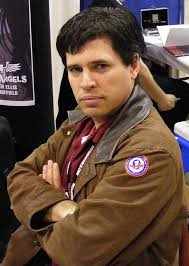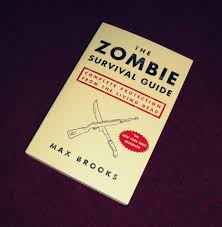Max Brooks: A Reading Hero Redefining the Image of Dyslexia
Posted by Brainspring on 16th Mar 2016
 Hi everyone,
Hi everyone,
This week’s Reading Hero is a hero in the classic sense of the word…if you are being attacked by zombies. Max Brooks is the best-selling author of World War Z and The Zombie Survival Guide and advocate for dyslexia awareness. Brooks credits dyslexia with contributing to his success, making him a “big-picture, outside-the-box thinker.”
If you’re familiar with Max Brooks, please share interesting facts or quotes in the comments!
Max Brooks Redefines the Image of Dyslexia
Max Brooks is a Reading Hero because he is a great example of the multifaceted effects of dyslexia, from creating anxiety to fostering survival skills. He is not defined by his learning disability, yet does not hide it. Here are my Top 3 Reasons Max Brooks is a Reading Hero, along with some inspiring quotes and links to articles and videos.
- He openly shares the huge impact anxiety has had on his life: wondering why he couldn’t be like everyone else and noting he seemed to work twice as hard to do half as well as everyone else.
- “For me, dyslexia was nearly as bad as the feelings of anxiety, shame, and low self-esteem that it caused. For me, ‘learned dependency’ was the real enemy, the self-narrative that “I can’t do this” can destroy children’s learning potential for the rest of their lives.”
- Watch his honest, enlightening speech to Congress: https://www.youtube.com/watch?v=Q7JS7ULzBFw
The effects of dyslexia reach beyond academics. What are some of the social, emotional or other effects you have seen in your students?
-
He embraces overcoming obstacles. He sees his struggles with dyslexia as helping make him successful; yet, he doesn’t apologize for accommodations.
- “I’m starting to see why people have sunk and why people have swum. A lot of the kids who skated through life, where things came easily to them, have never had to struggle. They’ve never had to create coping mechanisms. They’ve never had to compensate for any sort of weakness, and it made them much less resistant to adversity. Kids who have had to struggle in early life can get comfortable with struggling. When adversity comes knocking in their 30s and 40s and 50s, well, they know how to overcome, whereas the kids who never had to study, always got straight As, never went to class. . . .”
- An interview with Brooks about his writing: http://www.nytimes.com/2013/06/23/magazine/max-brooks-is-not-kidding-about-the-zombie-apocalypse.html
- More on the accommodations Brooks’ mother advocated for: http://dyslexia.yale.edu/maxbrooks.html
Do you see positive effects of dyslexia as well? Are those students sometimes more resilient or have better problem-solving skills?
- He supports dyslexia training for teachers.
- “A little awareness and flexible teaching methods could unlock unlimited potential in these kids who now think they’re losers. If we already have mandatory racial sensitivity training for our police, why not have mandatory dyslexia recognition training for our teachers? It’s so simple, so easy, and when you look at all the other government programs designed to help citizens help themselves, it’s probably the least expensive.”
- Max Brooks was the keynote speaker at this year’s Spotlight on Dyslexia conference: https://go.learningally.org/world_war_d_dyslexia/
Do you think teacher awareness is one of the main components to addressing dyslexia in the US?

Please remember to share and subscribe!
